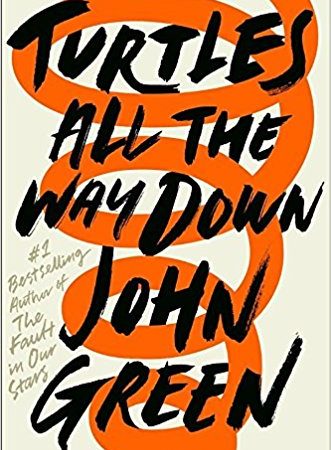 It’s a little cringe-worthy to have to admit, but I am a huge John Green fan, far outside of his popularity due to the movie adaptation of The Fault In Our Stars. I first experienced Green’s writing when I was assigned to read his 2005 novel Looking For Alaska as part of a college course on writing for children and young adults. I was instantly captivated by Green’s beautiful talent for characterization. The story was simple and yet unique, the ending haunted me, and I immediately went on to quickly read all of Green’s other novels. When I heard that he would be publishing a new novel in 2017, I excitedly anticipated its release.
It’s a little cringe-worthy to have to admit, but I am a huge John Green fan, far outside of his popularity due to the movie adaptation of The Fault In Our Stars. I first experienced Green’s writing when I was assigned to read his 2005 novel Looking For Alaska as part of a college course on writing for children and young adults. I was instantly captivated by Green’s beautiful talent for characterization. The story was simple and yet unique, the ending haunted me, and I immediately went on to quickly read all of Green’s other novels. When I heard that he would be publishing a new novel in 2017, I excitedly anticipated its release.
I purchased, read, and finished Turtles All The Way Down in less than 24 hours. The characters in Green’s latest work are just as fascinating as his previous works. I can’t think of a single author who captures the true spirit of teen angst as skillfully as John Green. This is what makes his writing so spellbinding to fans of young adult fiction. Like his other novels, Turtles All The Way Down features a small cast of smart, witty, quirky teenagers. The topics of discussion range from lighthearted arguments about Star Wars fan theories to heart wrenching talks about death and absentee parents. Green cautiously walks the line between tragedy and comedy.
The novel centers on the struggles of 16-year-old Aza Holmes, a teen plagued by paralyzing anxiety and OCD. The most haunting part of Turtles All The Way Down is that not only can Aza not escape her crippling anxious spirals, neither can we as the readers. As the novel progresses, we too become trapped in Aza’s internal dialogue and inability to relate to others as a normal teenager.
“Please just let me out. Whoever is authoring me, let me up out of this. Anything to be out of this. But I couldn’t get out.” (211)
While his other novels are interspersed with constant humor, there aren’t very many points in Turtles All The Way Down where Green gives us any relief from Aza’s inner turmoil. At one point, Aza reads Davis Pickett’s (her friend and crush) blog post about the heart of anxiety:
‘The greatest weapon against stress is our ability to choose one thought over another.’
–William James
I don’t know what superpower William James enjoyed, but I can no more choose my own thoughts than choose my name.
“The way he talked about thoughts was the way I experienced them – not as a choice but as a destiny. Not a catalog of my consciousness, but a refutation of it.” (58)
Davis summarizes just how difficult it can be to deal with any kind of mental illness. Aza succumbed to almost constant stress because she had lost her only ability to fight against it – the ability to control her thought process. As the novel progresses, Aza falls deeper and deeper into her anxiety and OCD, which eventually lands her in the hospital. Without an ounce of disrespect or humor, Green bravely speaks about issues that not many people are willing to discuss. Teenage mental illness is on the rise, and Turtles All The Way Down powerfully shows the consequences for a teenager who struggles with accepting professional help.
The novel’s primary adventure revolves around Davis’ father, Russell Pickett, a billionaire who mysteriously disappears. The substantial reward offered by law enforcement for any information on him compels Aza and her best friend Daisy to embark on a journey to figure out what exactly had happened to the rich businessman. As Aza reconnects with Davis, a childhood friend, a rocky love story unfolds. Ultimately, the novel ends much like Green’s prior works: a suitable, imperfect conclusion that leaves the reader simultaneously satisfied and disappointed.
“I know a shrink would say, Write it down, how you got here. So you would, and in writing it down you realize, love is not a tragedy or a failure, but a gift. You remember your first love because they show you, prove to you, that you can love and be loved, that nothing in this world is deserved except for love, that love is both how you became a person, and why.” (284)
Aza’s final remarks in the novel summarize the core of the story’s conclusion – it is neither happy nor sad. What matters most is not the outcome of solving a dilemma, but rather the lessons learned along the way.



